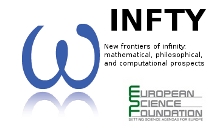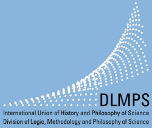
|
Call for Papers.FotFS VIII: History and Philosophy of Infinity Submission website: https://www.easychair.org/conferences/?conf=fotfs8
Keynote Speakers. Haim Gaifman (Columbia University, U.S.A.), Marcus Giaquinto (University College London, England), Catherine Goldstein (Institut de Mathematiques de Jussieu, France), Christian Greiffenhagen (University of Nottingham, England), Luca Incurvati (University of Cambridge, England), Matthew Inglis (Loughborough University, England), Charles Parsons (Harvard University, U.S.A.), Michael Potter (University of Cambridge, England), Christian Tapp (Ruhr-Universität Bochum, Germany), Pessia Tsamir (Tel Aviv University, Israel), Dina Tirosh (Tel Aviv University, Israel), Jean Paul Van Bendeghem (Vrije Universiteit Brussel, Belgium). Conference Theme. The concept of infinity has fascinated philosophers and mathematicians for many centuries: e.g., the distinction between the potential and actual infinite appears in Aristotle's Physics (in his treatment of the paradoxes of Zeno) and the notion was implied in the attempts to sharpen the method of approximation (starting as early as Archimedes and running through the middle ages and into the nineteenth century). Modern mathematics opened the doors to the wealth of the realm of the infinities by means of the set-theoretic foundations of mathematics. Any philosophical interaction with concepts of infinite must have at least two aspects: first, an inclusive examination of the various branches and applications, across the various periods; but second, it must proceed in the critical light of mathematical results, including results from meta-mathematics. The conference History & Philosophy of Infinity will emphasize philosophical, empirical and historical approaches. In the following, we give brief descriptions of these approaches with a number of questions that we consider relevant for the conference:
Submission. We are cordially inviting all researchers to submit proposals for presentations covering either historical or philosophical aspects of infinity, or dealing with empirical investigations of infinity in relation to the historical and philosophical aspects. For more information about submission, please consult our website at http://www.math.uni-hamburg.de/home/loewe/HiPhI/submission.html. Scientific Committee. Brendan Larvor (Hatfield, U.K.), Benedikt Löwe (chair; Amsterdam, The Netherlands & Hamburg, Germany), Peter Koellner (Cambridge MA, U.S.A.), Dirk Schlimm (Montreal, Canada). FotFS VIII is sponsored by the ESF network INFTY: New frontiers of infinity and Division for Logic, Methodology and Philosophy of Science of the International Union for History and Philosophy of Science (DLMPS/IUHPS). 


|

 Invited Speakers
Invited Speakers

 Programme
Programme Registration & Grants
Registration & Grants Local Information
Local Information